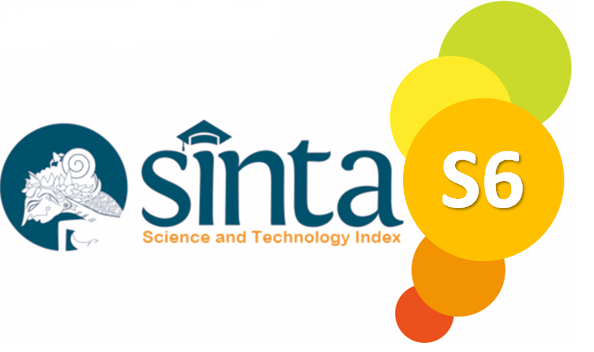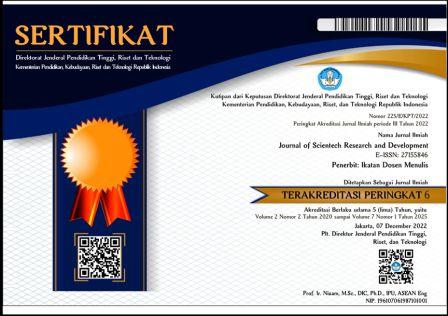MENJELAJAHI ADOPSI KECERDASAN BUATAN UNTUK HUKUM PERKOTAAN CERDAS: SEBUAH PENELITIAN AWAL
Abstract
Urbanisasi mendorong pertumbuhan ekonomi, dibantu oleh teknologi dan layanan digital. Kota memiliki karakteristik sosial, spasial, budaya, strategis, dan ekonomi di luar populasinya. Kota ini lebih dari sekadar tempat untuk kerja lapangan; itu menjadi subjek studi tentang bagaimana kehidupan perkotaan diciptakan, diatur, dan dialami. Hukum perkotaan adalah bidang sosio-hukum baru yang meneliti bagaimana kota membuat peraturan. Mengatur sebuah kota memerlukan lingkungan institusi dan kelompok pemangku kepentingan yang rumit dengan beragam kepentingan. Kota membutuhkan tata kelola yang cerdas untuk menghubungkan semua kekuatan, berbagi informasi, dan mempromosikan keberlanjutan sosial ekonomi dan lingkungan. Keterlibatan digital dengan publik telah menyebabkan pemerintah kota menggunakan teknologi digital dan crowdsourcing dalam proses pembuatan undang-undang. Artikel ini membahas bagaimana AI dapat membantu pemerintah kota meningkatkan hukum perkotaan melalui crowdsourcing. Studi ini mengumpulkan data dari Dimensions.ai. Ilmu Digital memperkenalkan Dimensions.ai pada Januari 2018. Temuan dari dapat membantu menghubungkan hukum perkotaan menggunakan AI dan crowdsourcing untuk menciptakan peraturan kota yang lebih partisipatif dan berkualitas tinggi.
References
Aitamurto, T., & Landemore, H. (2015). Five Design Principles for Crowdsourced Policymaking: Assessing the Case of Crowdsourced Off-Road Traffic Law in Finland. Journal of Social Media for Organizations, 2(1), 1–19.
Aitamurto, T., Landemore, H., Lee, D., & Goel, A. (2014). Crowdsourced Off-Road Traffic Law Experiment in Finland. Report About Idea Crowdsourcing and Evaluation.
Allam, Z., Bibri, S. E., Jones, D. S., Chabaud, D., & Moreno, C. (2022). Unpacking the ‘15-Minute City’ via 6G, IoT, and Digital Twins: Towards a New Narrative for Increasing Urban Efficiency, Resilience, and Sustainability. Sensors, 22(4), 1–17. https://doi.org/10.3390/s22041369
Allam, Z., Sharifi, A., Bibri, S. E., Jones, D. S., & Krogstie, J. (2022). The Metaverse as a Virtual Form of Smart Cities: Opportunities and Challenges for Environmental, Economic, and Social Sustainability in Urban Futures. Smart Cities, 5(3), 771–801. https://doi.org/10.3390/smartcities5030040
Alsina, V., & Martí, J. L. (2017). The Birth of the CrowdLaw Movement: Tech-Based Citizen Participation, Legitimacy and the Quality of Lawmaking. Analyse Und Kritik, 40(2), 337–358. https://doi.org/10.1515/auk-2018-0019
Andrews, M., Limits, T., Reform, I., Rules, C., Solutions, R., & York, N. (2006). Reinventing Government Through On-Line Citizen Involvement in The Developing World: A Case Study of Taipei City Mayor’s E-mail Box in Taiwan. Public Administration and Development, 26, 409–423. https://doi.org/10.1002/pad
Bibri, S. E., Alexandre, A., Sharifi, A., & Krogstie, J. (2023). Environmentally Sustainable Smart Cities and Their Converging AI, IoT, and Big Data Technologies and Solutions: An Integrated Approach to an Extensive Literature Review. Energy Informatics, 6(1). https://doi.org/10.1186/s42162-023-00259-2
Bibri, S. E., & Allam, Z. (2022). The Metaverse as a Virtual Form of Data-Driven Smart Cities: The Ethics of the Hyper-Connectivity, Datafication, Algorithmization, and Platformization of Urban Society. Computational Urban Science, 2(1), 1–22. https://doi.org/10.1007/s43762-022-00050-1
Božilovć, J. (2019). on the Concept of Urban Citizenship. Facta Universitatis, Series: Philosophy, Sociology, Psychology and History, February, 189. https://doi.org/10.22190/fupsph1803189b
Certomà, C., Corsini, F., & Rizzi, F. (2015). Crowdsourcing Urban Sustainability. Data, People and Technologies in Participatory Governance. Futures, 74, 93–106. https://doi.org/10.1016/j.futures.2014.11.006
da Cruz, N. F., Rode, P., & McQuarrie, M. (2019). New Urban Governance: A Review of Current Themes and Future Priorities. Journal of Urban Affairs, 41(1), 1–19. https://doi.org/10.1080/07352166.2018.1499416
Davidson, N. M. (2013). What is Urban Law Today? An Introductory Essay in Honor of the Fortieth Anniversary of the Fordham Urban Law Journal. Fordham Urban Law Journal, 41(5), 1579–1593.
Digital Science. (2018). Dimensions - Reimagining Discovery and Access to Research. Digital Science Homepage.
Drahmann, A., & Meuwese, A. (2022). AI and Lawmaking: An Overview. In B. Custers & E. Fosch-Villaronga (Eds.), Law and Artificial Intelligence Regulating AI and Applying AI in Legal Practice. T.M.C. Asser Press.
Feddersen, M., & Santana, L. E. (2022). Unpacking the Democratic Affordances of CrowdLaw Concept and Practice: ‘It Feels Like Being Part of the Game.’ Politics, 42(3), 340–357. https://doi.org/10.1177/0263395720973850
Friendly, A. (2019). The Contradictions of Participatory Planning: Reflections on the Role of Politics in Urban Development in Niterói, Brazil. Journal of Urban Affairs, 41(7), 910–929. https://doi.org/10.1080/07352166.2019.1569468
Glasser, M. D., & Berrisfoard, S. (2015). Urban Law A Key to Accountable Urban Government and Effective Urban Service Delivery. In The World Bank Legal Review Volume 6 Improving Delivery in Development: The Role of Voice, Social Contract, and Accountability (Issue March). https://doi.org/10.1596/978-1-4648-0378-9
Golubchikov, O., & Thornbush, M. J. (2022). Smart Cities as Hybrid Spaces of Governance: Beyond the Hard/Soft Dichotomy in Cyber-Urbanization. Sustainability, 14(16), 10080. https://doi.org/10.3390/su141610080
Gomaa, N. S., & Emam, W. M. (2023). Evaluation of the Possibility of Applying Artificial Intelligence Technology in Egyptian Smart City Planning. MSA University Engineering Journal, 2(2), 1–18. https://doi.org/10.21608/MSAENG.2023.291876
Herzog, C., Hook, D., & Konkiel, S. (2020). Dimensions: Bringing down barriers between scientometricians and data. Quantitative Science Studies, 1(1), 387–395. https://doi.org/10.1162/qss_a_00020
Huang, X., & Yost-Bremm, C. (2018). The power law within a metropolitan area. Cities, 72(October 2016), 201–205. https://doi.org/10.1016/j.cities.2017.08.001
Iaione, C., & Nictolis, E. De. (2020). The role of law in relation to the New Urban Agenda and the European Urban Agenda A multi-stakeholder perspective. In N. M. Davidson & G. Tewari (Eds.), Law and the New Urban Agenda The. Routledge.
Kankanhalli, A., Charalabidis, Y., & Mellouli, S. (2019). IoT and AI for Smart Government: A Research Agenda. Government Information Quarterly, 36(2), 304–309. https://doi.org/10.1016/j.giq.2019.02.003
Layard, A. (2020). Researching Urban Law. German Law Journal, 21(7), 1446–1463. https://doi.org/10.1017/glj.2020.85
Malodia, S., Dhir, A., Mishra, M., & Bhatti, Z. A. (2021). Future of e-Government: An integrated conceptual framework. Technological Forecasting and Social Change, 173(July), 121102. https://doi.org/10.1016/j.techfore.2021.121102
Mihalopoulos, A. P.-. (2007). In the lawscape. In Andreas Philippopoulos- Mihalopoulos (Ed.), Law and the City (pp. 205–220). Routledge-Cavendish. https://doi.org/10.4324/9780203945155
Orduña-Malea, E., & Delgado López-Cózar, E. (2018). Dimensions: re-discovering the ecosystem of scientific information. El Profesional de La Información, 27(2), 420–431. https://doi.org/10.3145/epi.2018.mar.21
Prpić, J., Taeihagh, A., & Melton, J. (2015). The fundamentals of policy crowdsourcing. Policy and Internet, 7(3), 340–361. https://doi.org/10.1002/poi3.102
Radzik-Maruszak, K., & Bátorová, M. (2015). Citizen Participation and Engagement in Urban Governance: Perception of Finnish and Polish Local Officials. NISPAcee Journal of Public Administration and Policy, 8(1), 85–110. https://doi.org/10.1515/nispa-2015-0005
Sassen, S. (2006). Territory, Authority, Rights. Princeton University Press.
Tyagi, N., & Bhushan, B. (2023). Demystifying the Role of Natural Language Processing (NLP) in Smart City Applications: Background, Motivation, Recent Advances, and Future Research Directions. Wireless Personal Communications, 857–908. https://doi.org/10.1007/s11277-023-10312-8
UN-Habitat. (2016). Rules of the Game: Urban Legislation.
UN-Habitat. (2022). Envisaging the Future of Cities. In World City Report.
van Buuren, A., van Meerkerk, I., & Tortajada, C. (2019). Understanding emergent participation practices in water governance. International Journal of Water Resources Development, 35(3), 367–382. https://doi.org/10.1080/07900627.2019.1585764
Williams, C. (2018). Start-up story: Dimensions from digital science. Insights: The UKSG Journal, 31. https://doi.org/10.1629/uksg.420
Xanthaki, H. (2016). Good Urban Law: What is it and how to draft it.
Yigitcanlar, T., Agdas, D., & Degirmenci, K. (2022). Artificial intelligence in local governments: perceptions of city managers on prospects, constraints and choices. AI and Society, 38(3), 1135–1150. https://doi.org/10.1007/s00146-022-01450-x
Yigitcanlar, T., Degirmenci, K., & Inkinen, T. (2022). Drivers Behind the Public Perception of Artificial Intelligence: Insights from Major Australian Cities. AI and Society, 0123456789. https://doi.org/10.1007/s00146-022-01566-0
Zhong, Y., Sun, L., & Ge, C. (2021). Key Technologies and Development Status of Smart City. Journal of Physics: Conference Series, 1754(1). https://doi.org/10.1088/1742-6596/1754/1/012102




















